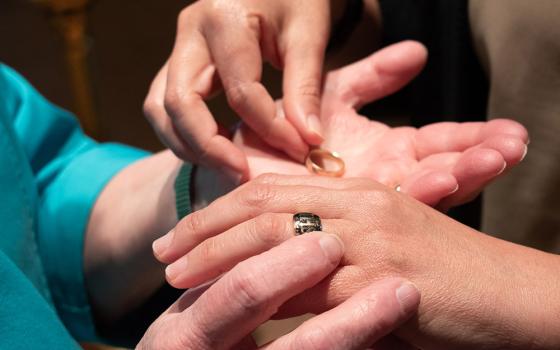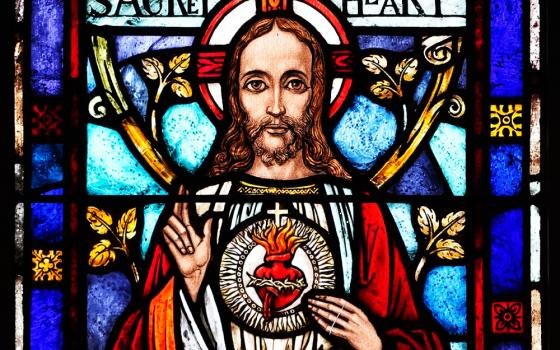
St. Paul de Chartres Sister Léonard Huynh Thi An consoles Agnes Nguyen Thi Gai, who is bedridden and about 98, at the Elderly Loving Home in Da Nang, central Vietnam. Gai has been abandoned by her relatives. (Joachim Pham)

(GSR logo / Toni-Ann Ortiz)
Editor's note: More than 1.6 billion people worldwide live in substandard housing. Of those, at least 150 million have no home at all. In this special series, A Place to Call Home, Global Sisters Report is focusing on women religious helping people who are homeless or lack adequate shelter. Over the next few months, we will examine how homelessness and a lack of affordable housing affect teens and young adults, families, migrants, the elderly and those displaced by natural disasters and climate change in stories from Kenya, India, Vietnam, Ireland, Puerto Rico, the Philippines, the United States and elsewhere.
In 2011 Martha Ho Thi Phan sold her only house for 350 million dong (about $15,000) and offered it to her three sons who are married.
Phan, who is from Da Nang City in central Vietnam, gave 150 million dong (about $6,400) to the eldest son and moved in to live with his family. By Vietnamese tradition, eldest sons take on the duty to look after their parents until their death.
The two other sons received the rest of the money. Phan's children do mostly manual jobs and earn low incomes.
Phan, who is now 84, had no problems with her eldest son's family until 2017, when she was hospitalized for her injured back after she slipped and landed flat on the floor.
Phan's daughter-in-law picked incessant quarrels with her husband over the burden of paying his mother's hospital fees. Finally, they abandoned her.
After she was discharged from the hospital, Phan lived with her other sons for only a short time because they could not afford to care for her due to their own financial and family problems.
They also refused to support her and accused the eldest son of taking money from their mother but not caring for her.
As a result, the mother of three had to live in the street and at local markets.
Her tragic story is typical of elderly people who become victims of poverty and cultural change in the families caring for them.
St. Paul de Chartres Sr. Léonard Huynh Thi An, who works with elderly homeless people in Da Nang, said more and more of them are abandoned by their relatives. Family circumstances and crises, including breakdowns in relationships, domestic violence, abandonment and rifts over inheritance are major causes of homelessness.
An said the children scramble to inherit their property to support their own families and then ignore their parents.
The World Bank reported in 2018 that 9 million of its then 93 million people still lived in extreme poverty in Vietnam, where poor people were defined as those who earned up to 700,000 dong ($31) a month in rural areas and 900,000 dong ($40) in cities, according to VnExpress International.
An said many people have to sell their houses or farmland to pay off debt or cover their medical treatment.

St. Paul de Chartres Sister Léonard Huynh Thi An, head of the Elderly Loving Home in Da Nang, talks with two elderly women who became homeless after they were abandoned by their children. (Joachim Pham)
"Old people live alone because their children suffer mental problems, divorce and separate from their spouses. Others are deserted by their sons- or daughters-in-law after their own children's death," she said.
There is a growing trend for young people to live independently of their elderly parents, often seeking employment in urban areas. Consequently, many older people are forced to live alone and in poverty.
The General Office for Population and Family Planning at the Vietnam Ministry of Health reported 72% of older people live with their children and grandchildren, but the trend in family sizes is changing from larger, traditional families to small, nuclear families.
Vietnam is a rapidly aging society, with the proportion of people age 60 or older climbing to almost 12 percent in 2019, and expected to more than double that by 2050, according to Saigoneer. Almost 70% live in rural areas.
Many older people have no retirement pensions and have to depend on their children's support. So when their children cannot support them, they end up living on the streets or in substandard housing.

Catharina Pham Thi Lien (second from left), 85, and other homeless women recite the rosary as they sit in their wheelchairs along the hallway. Prayer is one of their daily activities at the Elderly Loving Home in Da Nang. (Joachim Pham)
Homeless people are invisible
The Ministry of Labor, War Invalids and Social Affairs reported that in 2019 the country recorded 11.4 million elderly people. Of those, only 10,000 people were under care in centers for the homeless.
Beggars, vagrants, sex workers, orphans, people with mental illnesses and those who have no dwellings are forcibly sent to crowded centers run by the government.
Government authorities request that city residents not give money directly to beggars and homeless people so as to limit the number of homeless.
Although many elderly are newly adrift in the culture, the government's numbers of homeless are low.
The Population and Housing Census taken in April 2019 revealed that the Southeast Asian country with a population of over 96 million had only 4,418 persons – about 4.6 percent – without a home to live in. The homeless included 310 vagrants and 1,244 households floating or docked on waterways that the government does not define as housing.
Vo Thanh Sang, deputy director of the statistics office in Ho Chi Minh City, where only 39 households were purported to be homeless, reportedly said those who lived in tents, camps or on the sidewalks were defined by the census as homeless family units, according to Tuoi Tre News. Those who resided under stairs, for example, but had partition walls and doors to separate their living space from their surroundings, were not considered homeless.

Tran Thi Mong, a homeless woman, sleeps on the ground next to her bicycle loaded with used items in a hospital compound in Hue, central Vietnam. Mong, 49, left her husband, who drinks and who wounded her and set fire to their house. He was imprisoned for his acts of violence. (Joachim Pham)
Some local newspapers reported that many people doubted the accuracy of the poll's findings since the astonishingly low number of homeless people seemed too good to be true. Real estate in the city is among the most expensive in Vietnam.
Nguyen Van Hung said he has become homeless in the city for 10 years after his mother died and his brother, a drug addict, sold their house.
Hung, 67, said he collects used items on the street for a living and sleeps on pavements and under bridges at night. "I live on food given by volunteers at midnight," he said.
"I regularly run away and hide myself in crowded streets to avoid being arrested by police," Hung said, looking around.
The latest national census also found that 7.7 million people lived in crowded houses, allowing below 8 square meters (86 square feet) per person.
Labor, War Invalids and Social Affairs Minister Dao Ngoc Dung told a meeting in Hanoi on Dec. 19, 2019, that social protection centers could not afford to receive the increasing number of older people who have no homes or suffer mental disorders. He said the government should offer private individuals aid to provide housing and care for homeless elders.

Sr. Marie Tran Thi Ha takes Anna Tran Thi Bon to the chapel at the home. (Joachim Pham)
Nuns care for homeless women
An, who runs the Elderly Loving Home in Da Nang, said local authorities send all homeless people and vagrants to government-run centers, which are very crowded. They have no housing options.
Established in 1996, the home offers free accommodation and care to 30 women, ages 70-100. The women are from Da Nang and the neighboring province of Quang Nam.
Sisters from parishes, who know older women's circumstances, send them to the home. Local authorities also refer elderly women without relatives to the nuns.
The home is served by six nuns and 20 volunteers who are students. Under the current pandemic, the home has kept pace with its mission because the residents do not go off the property and maintain a low risk of exposure, An says.
Phan said she gained admittance into the home in 2018 after the nuns found her homeless. "I found my home here and I decided to embrace Catholicism last December," she said.
Mary Nguyen Thi Hai, dressed in brown clothes, every day uses a walker to move around the yard in front of the home.

Mary Nguyen Thi Hai, 81, takes in the fresh air after she walks around the yard of the Elderly Loving Home in Da Nang. Hai became homeless in 2014 after her daughter sold her house and moved away because she could not repay her debt to local loan sharks. (Joachim Pham)
"I am happy here. The nuns and volunteers serve me good food, help me do personal hygiene and other things, and treat my high blood pressure and disorders of vestibular function," the woman from Quang Nam Province said.
Her grandson sent her to the home in 2014 after her daughter sold her house and moved away to find work because she could not repay her debt to local loan sharks.
"This is my home and they [nuns and volunteers] are my real relatives because my own relatives have abandoned me," the 81-year-old woman said.
A volunteer raises and puts 85-year-old Maria Nguyen Thi Can into a wheelchair, then pushes the chair to the toilet, washing and changing Can's clothes before lunch.
Can, who is thin and weak, said she lived alone in a ramshackle shelter and collected used items from garbage for a living after her son died in a road accident in 2006.
In 2014, a neighbor found her sick and took her to a local hospital where a St. Paul de Chartres sister looked after her.
"After my recovery, the nuns got government permits and admitted me into their home," Can said.

Teresa Hoang Thi Kim Dung, a volunteer, helps an elderly woman move around as she exercises at the center. Some 20 students volunteer to serve older women at the Elderly Loving Home in Da Nang. (Joachim Pham)
"I have everything here. My life changes as I am treated with deep respect and love here," she said, adding that she has good friends to talk with.
Can, who received Catholicism in 2016, said she attends daily Mass and recites the rosary and Divine Mercy.
"Most of the elderly women feel real peace, love, charity, sisterhood and dignity and consequently follow Catholic faith after their admittance to the home," An said.
Sr. Marie Tran Thi Ha said the women each have a bed and wardrobe. Those who cannot walk share the same hall so that the nuns and volunteers can serve them easier.
She said they have four meals a day, do exercises, walk around the home and pray together. Those who are too weak are fed by hand. Those who suffer serious diseases are hospitalized and the nuns look after them there.
"We tell them funny and nice stories before their bedtime so that they can regain positive feelings in life," Ha said.
They are given flowers and gifts on their birthdays and feast days. They also celebrate death anniversaries of people they knew.
Advertisement
Ha said the nuns keep in contact with the women's relatives and ask them to pay visits to those who are dying and, later, attend their funerals. The home has a 5,000-square-meter cemetery to bury the dead.
An said the home survives on donations from the Mother House of Da Nang Province of St. Paul de Chartres Sisters and local benefactors, who provide rice, clothes, medicine, money and wheelchairs. The province has 500 members.
Volunteers plant vegetables and raise poultry at the home's garden to serve the women.
"All what we do aims at saying that all people deserve proper housing, being loved and treated fairly," An said.
[Joachim Pham is a GSR correspondent from Vietnam.]














